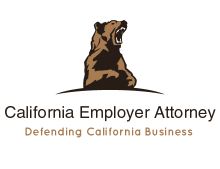Get specific examples of what should be in your employee handbooks
Looking for Good Examples of Employee Handbooks?
Here we go again! Another blog post about one of our favorite subjects… Employee Handbooks! We know, we know, employee handbooks again? but its just because we care about protecting your business and there is no better way at affordable price then having a solid Employee Handbook.
One of the most common questions we get is “What are good examples of Employee Handbook policies?” Well of course there may be some slight differences of what you need to focus on depending on what state you are in and its laws. For the most part there are some basic policies that should cover most situations. California is one of the most strict states for labor laws and that is what the policies in our handbooks are created to satisfy.
So lets take a look at some of the “must have” policies.
First part of the Handbook
INTRODUCTION
You will want to have a good introduction at the start of your employee handbook that welcomes the employee to the company. This is often a letter to employees from the CEO or owner of the company with their signature at the bottom. There is a lot of flexibility in the introduction. You can briefly go over the mission of the company or maybe just keep it to a simple welcome letter.
DESCRIPTION
After the introduction letter you will want to give a description of the employee handbook. Here you can include your expectation that the employee read and understand the policies. You can add that the company has the right to revise the handbook at any time, so if you ever need to change policies at a later, then when the employee received this copy you will be covered. You may want to also include a paragraph describing your an “Equal Opportunity Employer” and that your company makes every effort to comply with federal and state discrimination laws.
JOB EXPECTATIONS
In this section its important to specify what is expected from the new hire in their job. (it does not need to be detailed for each individual job, more of company expectation for employee performance). Most companies have some type of trial period of 3 or 6 months where the employee is being trained and evaluated. After this probationary period is over the employer (you) might have higher expectations of their performance.
Second Part of the Handbook
Here is where you really want to get into the meat of things and start specifying your company policies. Below is a list of some of the most common and what we include in the Handbooks we create for our clients. Each policy is followed by a brief description.
Working Hours and Schedule – Specify your standard business hours and typical employee working schedule expectations.
Meal and Rest Periods – Make sure you don’t miss this one! Many employee claims against employers come from accusations of not allowing the minimum state mandated time for meal breaks and rest periods. Specify what your policy is making sure it meets the minimum required by law.
Pay/Timekeeping/Overtime – Specify what your company pay schedule is. Employees work to get paid and they expect to know exactly when that is. This is where you spell this out, be it weekly, bi-weekly etc. Also let your employees know what is expected from them when it comes to timekeeping (clocking in/out of work). Many disputes between employers and employees come from time worked discrepancies. You can help reduce much of this confusion with clear policies mandating strict timekeeping requirements. This leads us into Overtime. Another common employee claim is they were not paid there rightful OT. By having the policies in place AND keeping strict and accurate employee time records you will reduce your exposure greatly!
Harassment Policies
Harassment policies are another common employee claim. To help protect your business specify your states harassment laws and make it crystal clear that your company does NOT tolerate any harassment of employees! The harassment policy is just as much (or even more so) for your managers and supervisors then it is your employees. Often we have seen an employer get hit with a harassment claim when they are not even the one being accused of harassment! One of their managers have been accused and your business is on the hook. By specifying your harassment policies you are protecting your business from supervisors as well, letting them know it will not be tolerated.
Prohibited Conduct
Now it’s impossible to cover every behavior you might find objectionable at work but you may as well try! Go ahead and list all of the conduct that you want your employees to know wont be tolerated. We wont go in a lot of detail here but some obvious examples of prohibited behavior might be, no theft or damage of company equipment, no working while intoxicated, etc…
Benefits/Terminations
If you offer additional benefits to your employees put them in writing. This may include Holiday pay, sick leave and health and medical packages. It could also include retirement benefits.
As far as terminations go, California is an “at-will” employment state meaning an employee or employer can sever their relationship at any point. For the employer you may terminate the employee at any time as long as its not for any of the “protected” reasons, discrimination etc..If you are in a state that is not “at-will” employment, then you will need to research your situation. The bottom line is put your termination policies in writing in the handbook.
Conclusion
This article is an example of employee handbook policies but does not even include all of the ones we have in our California Employee Handbooks. There is just too many possible policies depending on your situation. We do hope that you have a better understanding of what some of the most important ones are.
If you are a California business owner who needs an employee handbook or just have questions on employee matters you do not know how to deal with, contact our professional labor attorneys today. We specialize in Employer defense and only protect business owners!
We are professional labor attorneys who specialize in defending California business owners. Contact Us Today!

